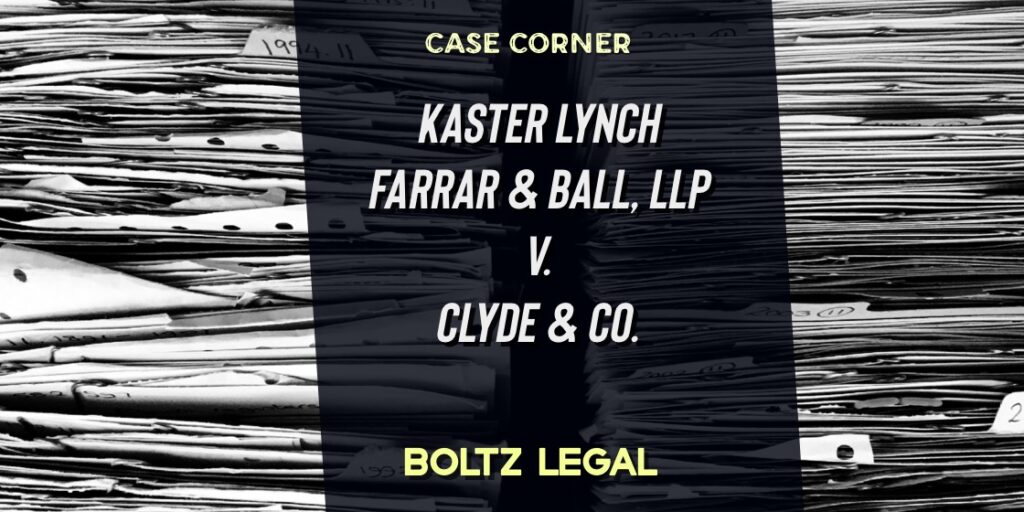Third District Court of Appeal, State of Florida
Case No. 3D23-1747
Opinion Filed: April 23, 2025
Judges: Logue, C.J., and Emas and Gordo, JJ.
Legal Area: Attorney’s Fees – Charging Liens – Legal Ethics – Settlement Enforcement
The Third District Court of Appeal reversed a lower court’s decision that discharged a settling defendant and their legal counsel from responsibility under a perfected charging lien. The case is a strong reminder of the obligations third parties and co-counsel carry in protecting law firms’ attorney’s fees after termination, especially when settlement funds are involved.
Background: Wrongful Death, Contingency Fees, and a Dispute Over Payment
This dispute arose out of a wrongful death claim filed by Mercina Souffrant, represented by Kaster Lynch Farrar & Ball, LLP (“Kaster Law”) and Santiago Asconape. Kaster Law acted as lead counsel and operated under a contingency fee agreement. Before a settlement was reached, Souffrant formally discharged Kaster Law in writing.
Shortly thereafter, Souffrant agreed to settle the lawsuit for $250,000 with Cooper Tire & Rubber Co. (“Cooper Tire”), represented by Clyde & Co., U.S., LLP (“Clyde Law”). Kaster Law, anticipating payment for work already performed, promptly filed a notice of charging lien to secure their interest in the proceeds.
The Broken Agreement: Clyde Law’s Promise and Subsequent Breach
Upon receiving notice of the lien, Clyde Law assured Kaster Law in writing that the settlement draft would include them as a payee and would be structured in such a way that their endorsement would be required before any funds could be cashed. This safeguard is standard practice to ensure that former counsel are compensated from settlement proceeds before any disbursements are made.
However, Clyde Law failed to follow through. After pressure from Asconape, they issued the settlement check payable to:
“Law Office of Asconape F/B/O Mercina Souffrant, PR of Est. of Herold Souffrant and Kaster, Lynch, Farrar & Ball, LLP.”
This subtle change enabled Asconape to deposit the check without Kaster Law’s endorsement—essentially cutting them out of the payment.
The Legal Fight: Charging Lien Enforcement and the Role of Notice
Kaster Law filed an enforcement action seeking equitable relief and damages. Their argument was straightforward: Clyde Law and Cooper Tire had actual notice of the lien and failed to protect it, violating well-established Florida law.
A charging lien gives an attorney the right to secure payment for legal services from settlement proceeds. Once notice is filed, parties disbursing settlement funds must take affirmative steps to protect that lien, including issuing joint checks, obtaining waivers, or holding funds in trust.
In this case, the trial court held that simply including Kaster Law’s name somewhere on the check was enough. The appellate court disagreed.
Appellate Court Ruling: Actual Notice Demands Actual Protection
The Third District reversed the trial court, holding that Clyde Law and Cooper Tire had an affirmative duty to safeguard Kaster Law’s lien—not just nominally include them. They stressed that merely listing a lienholder does not fulfill the duty of protection when the settlement check can be negotiated by another party without their knowledge or endorsement.
Citing Geico Gen. Ins. Co. v. Steinger, Iscoe & Greene-II, P.A., the court emphasized:
“The paying party has an affirmative duty to notify the lienor law firm of the settlement and to protect the law firm’s lien interest in the settlement proceeds.”
Clyde Law failed that duty by issuing a check that allowed Asconape to unilaterally cash out the full amount. Therefore, Clyde Law and Cooper Tire may be held jointly and severally liable for Kaster Law’s unpaid attorney’s fees.
Key Legal Takeaways: Charging Liens and Third-Party Liability
- Charging liens are enforceable when notice is provided.
Once filed and served, a charging lien creates a legal obligation for all parties involved in disbursing settlement proceeds. - Actual notice creates affirmative duties.
Parties with notice of the lien must actively prevent the diversion of settlement funds and can be held liable if they fail to do so. - Ambiguous settlement checks do not satisfy legal duties.
Checks must be structured so lien-holder firms cannot be bypassed. The inclusion of a firm’s name does not mean much if their endorsement is not required. - Joint and several liability is on the table.
Florida law allows for joint and several liability when funds are improperly disbursed after lien notice. This holds true even if misconduct comes from another attorney.
Final Judgment
The appellate court reversed the trial court’s ruling and remanded the case with instructions for the trial court to enter a judgment in favor of Kaster Law. Cooper Tire and Clyde Law will now be jointly and severally liable for the amount listed in the perfected charging lien.
Implications for Law Firms and Litigators
This decision is a stark warning for attorneys and insurers handling settlement disbursements. Once a charging lien is filed, it’s not enough to acknowledge it—you must act to ensure it’s respected. Drafting a check in a way that allows a lienor to be cut out of the payment stream is a legal misstep with costly consequences.
For law firms, this case reinforces the value of filing charging liens promptly and confirming protections in writing. It also makes clear that any deviation from agreed-upon disbursement structures could result in costly litigation—and liability.
Today’s Insight
“Justice is the constant and perpetual will to allot every man his due.”
— Domitus Ulpian, Roman Jurist
This case underscores the essential balance between advocacy and ethics in the legal profession. When settlement funds are at stake, doing the right thing is not optional—it’s the law.

